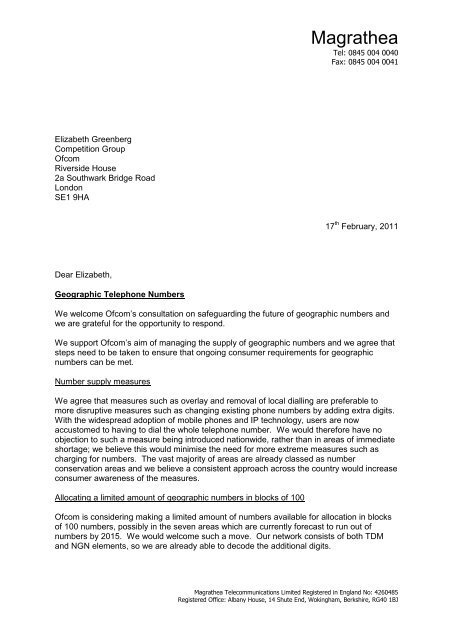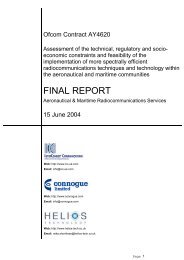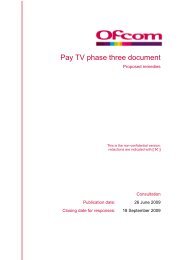Magrathea - Stakeholders - Ofcom
Magrathea - Stakeholders - Ofcom
Magrathea - Stakeholders - Ofcom
Create successful ePaper yourself
Turn your PDF publications into a flip-book with our unique Google optimized e-Paper software.
<strong>Magrathea</strong><br />
Tel: 0845 004 0040<br />
Fax: 0845 004 0041<br />
Elizabeth Greenberg<br />
Competition Group<br />
<strong>Ofcom</strong><br />
Riverside House<br />
2a Southwark Bridge Road<br />
London<br />
SE1 9HA<br />
17 th February, 2011<br />
Dear Elizabeth,<br />
Geographic Telephone Numbers<br />
We welcome <strong>Ofcom</strong>’s consultation on safeguarding the future of geographic numbers and<br />
we are grateful for the opportunity to respond.<br />
We support <strong>Ofcom</strong>’s aim of managing the supply of geographic numbers and we agree that<br />
steps need to be taken to ensure that ongoing consumer requirements for geographic<br />
numbers can be met.<br />
Number supply measures<br />
We agree that measures such as overlay and removal of local dialling are preferable to<br />
more disruptive measures such as changing existing phone numbers by adding extra digits.<br />
With the widespread adoption of mobile phones and IP technology, users are now<br />
accustomed to having to dial the whole telephone number. We would therefore have no<br />
objection to such a measure being introduced nationwide, rather than in areas of immediate<br />
shortage; we believe this would minimise the need for more extreme measures such as<br />
charging for numbers. The vast majority of areas are already classed as number<br />
conservation areas and we believe a consistent approach across the country would increase<br />
consumer awareness of the measures.<br />
Allocating a limited amount of geographic numbers in blocks of 100<br />
<strong>Ofcom</strong> is considering making a limited amount of numbers available for allocation in blocks<br />
of 100 numbers, possibly in the seven areas which are currently forecast to run out of<br />
numbers by 2015. We would welcome such a move. Our network consists of both TDM<br />
and NGN elements, so we are already able to decode the additional digits.<br />
<strong>Magrathea</strong> Telecommunications Limited Registered in England No: 4260485<br />
Registered Office: Albany House, 14 Shute End, Wokingham, Berkshire, RG40 1BJ
<strong>Magrathea</strong><br />
We see no reason why CPs should not have to demonstrate demand for numbers in these<br />
smaller blocks in order to secure an allocation. Such demand might take the form of<br />
requests from end users or wholesale customers.<br />
We would not object to the allocation of blocks of 100 numbers being extended beyond the<br />
seven areas that may require more numbers before 2015. We would appreciate clarification<br />
from <strong>Ofcom</strong> on the extent to which it is able to introduce this measure, as we believe it<br />
should be used as extensively as possible, in preference to charging for number blocks.<br />
Reservation Process<br />
We agree that there is currently no incentive on CPs not to apply for number allocations<br />
before they are actually needed. We therefore think that the reservation processes<br />
described in paragraphs 5.33 to 5.41 could be useful in the case of CPs who have yet to<br />
establish interconnect arrangements with other carriers. We do not believe that such a<br />
system would be anti-competitive, since <strong>Ofcom</strong> would not withhold numbering allocations<br />
from anyone who was in a position to utilize them. Indeed, reserving an allocation for a CP<br />
should assist that CP in securing an interconnect agreement and thus entering the market.<br />
We see no reason why a network operator would not enter into interconnect negotiations<br />
with a CP with a reserved (but as yet unallocated) block.<br />
However, it would not be appropriate to apply this procedure to established CPs who have<br />
long-established interconnect arrangements and are already terminating calls on their own<br />
number ranges. <strong>Ofcom</strong> will need to decide upon the extent to which it will require evidence<br />
that a CP has at least one interconnect agreement in place. In the case of many<br />
established operators, this will be obvious. But there may be some CPs where it is not so<br />
apparent. What evidence of interconnect agreements will <strong>Ofcom</strong> require? We look forward<br />
to discussing the details further with <strong>Ofcom</strong>.<br />
Changes to the Geographic Number Application Form<br />
<strong>Ofcom</strong> have suggested that they might request information on how and when the numbers<br />
will be marketed to customers and the type of service for which the numbers will be used.<br />
We do not believe that, for number allocation purposes, <strong>Ofcom</strong> needs to record the type of<br />
service for which numbers will be used. This may well differ from number to number within<br />
a block, particularly where sub-allocation is involved. For the purposes of number block<br />
allocation, <strong>Ofcom</strong> should only be concerned that the CP is using the number in compliance<br />
with the Numbering Plan.<br />
If, at some point in the future, we move to a more automated allocation procedure where<br />
individual numbers are taken from and added to a database, then questions as to use will<br />
certainly be redundant. Whilst the use to which a number is to be put may help to focus the<br />
mind of the applicant, we believe that it should not be a pre-requisite to obtaining an<br />
allocation because it is not, strictly speaking, relevant.<br />
<strong>Ofcom</strong> should keep in mind the fact that some network operators require numbers for the<br />
use of resellers and/or other CPs for sub-allocation. These applicants should only need to<br />
demonstrate that they have received a request for a number from a wholesale customer as<br />
a pre-condition to being granted an allocation. We look forward to responding to <strong>Ofcom</strong>’s<br />
consultation on changes to the application form when it is published.<br />
2
<strong>Magrathea</strong><br />
<strong>Ofcom</strong> is considering whether to examine the extent to which CPs have actively marketed<br />
numbers when conducting audits of number block utilisation. Again, we would caution that<br />
wholesale providers will tend to market their services more directly and less overtly.<br />
Charging for Geographic Numbers<br />
We agree with <strong>Ofcom</strong>’s objectives in seeking to charge for numbers, i.e. to promote the<br />
efficient use of numbers, to minimise competitive distortion between CPs and to minimise<br />
negative impacts on consumers.<br />
For the reasons set out in the consultation document, we agree with <strong>Ofcom</strong> that<br />
Administrative Incentive Pricing is preferable to auction, and a periodic annual charge is<br />
preferable to a lump sum charge.<br />
We do, however, have two concerns about <strong>Ofcom</strong>’s proposals. Firstly, operators who have<br />
long-standing allocations are likely to be holding many blocks of 10,000 numbers, whereas<br />
operators who are new to the market will have been given mostly blocks of 1,000 numbers.<br />
This puts the more established operators at a disadvantage. We would therefore suggest<br />
that CPs are charged per block, rather than per number, and are charged the same for a<br />
block of 10,000 as they are for a block of 1,000. According to your table on page 140, this<br />
approach seems to taken in Belgium, Czech Republic, Lithuania and Slovak Republic.<br />
We understand that <strong>Ofcom</strong> will be concerned to provide an incentive to CPs to give back<br />
unused blocks of 1,000 within 10,000 blocks. However, this is only possible in a few<br />
instances, since CPs are likely to have allocated numbers within most or all of the 1,000<br />
blocks within a block of 10,000. We suggest that a better way of getting back unused<br />
blocks would be to conduct a thorough audit of CPs’ holdings in those areas with acute<br />
number shortage and request that unused blocks are returned.<br />
We are also concerned that 10p per number is an unreasonably high price. Very few<br />
countries charge more than 10p and most charge considerably less. <strong>Ofcom</strong> justifies the 10p<br />
charge on the grounds that it does not propose to impose charges for numbers in area<br />
codes where it does not foresee scarcity. We do not agree with <strong>Ofcom</strong>’s reasoning.<br />
Broadening the reach of the charge remains a possibility unless <strong>Ofcom</strong> is prepared to rule it<br />
out. Indeed <strong>Ofcom</strong> admits that the scheme could potentially extend to 79% of allocated UK<br />
numbers if it decides to extend charging to all 590 conservation areas. It would be<br />
problematic to introduce a lower charge at a later date. So a charge should be levied on the<br />
assumption that it could, one day, apply everywhere. We believe it should be around 7p, in<br />
line with the European average.<br />
Sub-Allocation - Improving utilisation of existing blocks<br />
Since charging for numbers changes the business model for communications service<br />
providers, it should not be introduced without an appropriate period of notice and only in<br />
those areas where the shortage is most acute.<br />
<strong>Ofcom</strong> suggests that efficient utilisation of number blocks could be improved if unused<br />
numbers were sub-allocated to CPs who require numbers, instead of those CPs requesting<br />
new number blocks from <strong>Ofcom</strong>. We agree in principle, and indeed sub-allocation has been<br />
a core part of our business for the last decade. Since the advent of VoIP, there has been<br />
increased demand for sub-allocated numbers, both from smaller operators who wish all of<br />
their numbers to be hosted, to larger operators who would rather not take on an entire<br />
number block in areas where they have fewer customers.<br />
3
<strong>Magrathea</strong><br />
In paragraph 6.85 <strong>Ofcom</strong> suggests that CPs with low utilisation of “opened” blocks may be<br />
able to reduce the impact of charging by sub-allocating numbers to other CPs. <strong>Ofcom</strong><br />
acknowledges that there is likely to be an excess of supply of numbers in the secondary<br />
market for a period of time. Realistically, larger operators are more likely to sub-allocate to<br />
smaller operators than the other way around. So those small CPs who find themselves with<br />
number blocks that, if charging is introduced, become uneconomic to continue to hold may<br />
not be able to find other CPs who are willing to take numbers from them. Even CPs who<br />
are willing to sub-allocate numbers are unlikely to want to hold a large number of blocks per<br />
area code, since they would be unlikely to be able to pass on sufficient numbers within<br />
multiple blocks to other CPs.<br />
So some small CPs may find themselves unable to find another CP to host their number<br />
blocks. It is these small CPs, those likely to have the lowest utilisation rates, who will be<br />
hardest hit by <strong>Ofcom</strong>’s proposals. <strong>Ofcom</strong> should not, therefore, impose such charges<br />
unless CPs are either given the opportunity to give back blocks of 100 numbers within each<br />
1,000 block that they hold (as suggested in Section 5) or given a very long period of notice<br />
(5 years, for example) before the introduction of charging.<br />
Faced with the new charging regime, they might be forced to give back their number blocks<br />
and require their customers to obtain new numbers from a different block already allocated<br />
to another CP. This would obviously result in inconvenience and expense for consumers.<br />
We note <strong>Ofcom</strong>’s suggestion in paragraph 6.112 that, where a CP wishes to return an<br />
under-utilised number block to <strong>Ofcom</strong>, <strong>Ofcom</strong> might facilitate the transfer of that block to a<br />
different provider. We would welcome this approach. An alternative could be to allow a CP<br />
notionally to return number blocks to <strong>Ofcom</strong>, whilst retaining those numbers already<br />
allocated to end users for a period of, say, five years, to give customers the ability to migrate<br />
away from those numbers over time. The CP would be unable to allocate any further<br />
numbers in that block. At the end of the period of amnesty, the block would be handed back<br />
to <strong>Ofcom</strong>.<br />
Porting Issues<br />
Some CPs have raised concerns that sub-allocation of numbers introduces problems and<br />
complexity into the porting process. Some feel that the process for porting sub-allocated<br />
numbers is not clear. We disagree. The process manual which is used by the industry for<br />
porting numbers makes clear that porting is carried out between the donor range holder and<br />
the network on which the recipient’s numbers are hosted and there are processes in place<br />
that cover the communication between network operators and service providers.<br />
The fact that the range holder may not have a contractual relationship with the end user<br />
does not impact on the range holder’s obligation to provide Portability under General<br />
Condition 18.5 (formerly 18.2). The sub-allocatee has its own obligations to deal with<br />
requests for number portability under General Condition 18.1. We acknowledge that the<br />
UK’s antiquated system of number portability can lead to problems with multiple providers in<br />
the value chain, but this is no more a problem with sub-allocation than it is in the case of<br />
switchless resellers.<br />
The main concern of donor operators would be facing an annual charge for numbers which<br />
have been ported out to another service provider. However, we note <strong>Ofcom</strong>’s proposals in<br />
paragraph 6.98 and Annex 4 to allow the range holder to recover that cost from the current<br />
service provider. <strong>Ofcom</strong> proposes that the range holder should be allowed to recover a cost<br />
4
<strong>Magrathea</strong><br />
per number based on average utilisation of the range holder’s blocks that are subject to<br />
charging, subject to a cap of 50p per number per year.<br />
Whilst we welcome this proposal, we think a lot more work would need to be done to<br />
consider the practicalities. How would CPs bill each other for this? Where billing is<br />
automated, how would they know whether the charge did or didn’t apply to a particular<br />
number? How could it be introduced retrospectively into porting contracts? How would it<br />
work in the case of subsequent ports?<br />
Increasing the number of blocks which are sub-allocated could actually alleviate problems<br />
with customer switching. Some CPs currently choose to obtain their own number blocks,<br />
whilst hosting them on another CP’s network. If the CP then ceases trading, there is no<br />
obligation on the CP who is hosting that block to continue to do so once the numbers are<br />
ported to another service provider. If numbers are, instead, sub-allocated from a network<br />
provider’s block, their obligations as range holder are clearer.<br />
If you have any queries with regard to any of the points made in this response, please do<br />
not hesitate to contact me.<br />
Yours sincerely<br />
Linus Surguy<br />
Director<br />
5
















